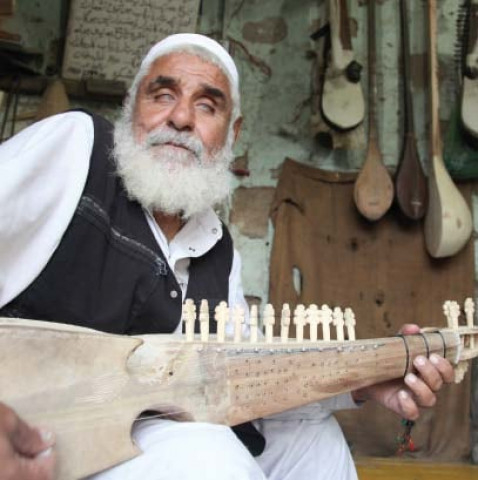Let the music play: Karachi’s sole rabab maker set to close up shop
Sohail Mohammad says that he can’t make ends meet any longer with the skill.

Let the music play: Karachi’s sole rabab maker set to close up shop
But the 35-year-old rabab maker - the only manufacturer in Sindh - won’t be providing rababs for much longer.
“There is nothing in this work; I can’t make ends meet from this. I am trying to get some other job and as soon as I get one, I will close this shop”, said Mohammad.
His shop’s closure will be a double blow to musicians in Sindh, since he clalims that no one else produces rababs in the province.
Like families in Khyber Pakhtunkhwa, Sohail Mohammad also learnt the craft of fashioning a rabab from his father, a carpenter, who started making rababs almost 50 years ago.
Making a rabab is hard work. It takes a month to finish and is priced at around Rs8,000, but depending on the design and embellishment, a rabab can cost Rs100,000 as well.
The increase in cost has driven away prospective customers, which he attributes to expensive raw material. “Wood and other materials were cheaper a few years ago. A rabab would cost only Rs1,500 and it was affordable. I used to sell some 25 to 30 rababs per year but now I can hardly sell 10 pieces,” he said.
Stringed musical instruments, including sitars, hang on the walls of his shop in Pathan Colony along with some old carpentry tools. Mohammad has no one to pass the craft on to. Some boys did come to him to learn how to make rababs, but they only managed to stay on for a year. “I had trained three young boys but all of them left this work as they can’t support their families (with this income). The three are now working in other fields.”
“I will never advise my sons to do this work,” he said.
Rababs are now being used by contemporary musicians as well, which has sparked more interest in the instrument. According to Mohammad, young people buy new rababs while musicians prefer to buy used or second-hand rababs as they produce more melodious sounds. The sound of a rabab improves with time - the more it is used and played, the better the melody. Mohammad also sells the rababs to musicians living abroad, including in Saudi Arabia, UAE, Malaysia, USA, England and Germany.
He also said he received more orders for rababs when the insurgency in Swat and other parts of Khyber Pakhtunkhwa was at its peak. However, he has to close his shop in Karachi whenever violence flares up.
Ziarat Khan Shakir, who plays and teaches rabab to eight students at Banaras, fears that if Sohail Muhammad gives up work then they will have no other person to repair rababs in Karachi.
“People not only buy new rababs from Muhammad’s shop but also get their instruments repaired there. Rabab is our culture. We have money for weapons but not for preservation of our culture and its heritage.”
Published in The Express Tribune, November 15th, 2011.



















COMMENTS
Comments are moderated and generally will be posted if they are on-topic and not abusive.
For more information, please see our Comments FAQ